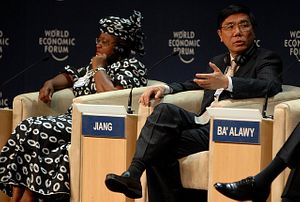Africa is now at the centre of a growing set of political and economic networks that at times are in competition, but which equally possess the potential to put what has been dismissed by some as the ‘hopeless continent’ firmly back on the map.
China’s role in Africa has progressed from modest interlocutor of the region to a leading trading partner with the entire continent. Bilateral trade last year reached over $118 billion. Between 2002 and 2009, Chinese investments in the continent went from $220 million to $1.44 billion. At the same time, African investment in China increased from $280 million to $1.31 billion, underscoring the two-way nature of this still-emerging relationship. Indeed, by the end of 2009, 50 African countries had made over 4,000 investments in China, with Mauritius leading the way, followed by South Africa, Nigeria, Egypt, Namibia, Tunisia and Seychelles.
That some of these are small states suggests that Africa is being used by Chinese investors—often in tandem with local partners—to reinvest capital back into China. China has been widely criticised for ignoring Western policies of ‘good governance’ and human rights in their dealings with Africa.
However, this is largely unfair.
It’s up to African leaders to manage their relations with China to benefit their own economies and citizens and certainly not Beijing’s responsibility to ‘look out’ for African self-interest. This is the job of Africa’s self-appointed and elected leaders. The idea that China’s historical ‘friendship’ with Africa relieves Africans of the responsibility to forge a mutually beneficial relationship is dangerous.
One obstacle currently faced by African nations is that the internal structure of any given state is all-important and varies widely across the continent. The fact that, for example, South Africa is a consolidated democracy by African standards accounts for the huge difference between the way Pretoria and Sierra Leone deal with China.
Furthermore, while China has an Africa policy, Africa doesn’t have a China policy, and the African Union has failed to come up with any official view on Sino-African ties, whether positive with regard to their benefits or negative with respect to their downsides. Consequently, as a collective unit, Africa has little actual negotiating power over China.
Yet this isn’t necessarily laying Africa open to exploitation. Fundamentally, Beijing’s engagement with Africa is grounded in pragmatism, and so it’s up to each African state to negotiate how and where it takes shape. In fact, China’s abandonment of ideology for economic growth actually affords Africa greater room to maneuver.
Some countries will end up taking advantage of this flexibility. In others, however, predatory elites unconcerned with promoting development will forfeit the chance to make the most of renewed Chinese interest in Africa. Depending on such a privileged few to do the right thing across many African states is indeed risky.
That’s why African civil society must play a crucial role in the new engagement with China. It’s up to Africans to organize, connect and ensure that their leaders enter into relationships with Beijing with open eyes for the sake of mutual benefit. Time and again, African governments have complained that they can’t deliver development due either to a lack of support or to interference from the West.
But with China’s new interest in Africa, resources come with no strings attached. Thus, any failure by African elites to share growth and strengthen the whole economy won’t be China’s fault but that of the African governments. Ordinary Africans can also play a crucial role in a true win-win situation by holding their leaders to account and critically examining the deals done with Beijing in their name.
Chinese involvement in Africa offers up a wealth of opportunities for the continent, but only if it approaches them prudently. How Sino-African relations will play out in the years to come—which Africans and which Chinese will benefit or lose, and in which states and economic sectors—are probably questions best left for future in-depth studies on the diverse nature of China’s engagement with the continent.
Ian Taylor is a professor in International Relations at the University of St. Andrews’ School of International Relations.













